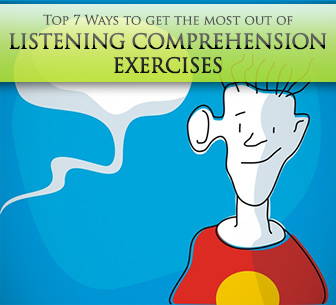Top 7 Ways to Get the Most out of Listening Comprehension Exercises


But to speak better, they have to listen better. Speaking and listening comprehension are like the two sides of the same communication coin. Students who lack the proper listening skills will have a much harder time communicating in English.

One of the hardest things about improving listening comprehension is that you can’t give your students a set of rules like the ones you give them for correct grammar and proper speaking. Students simply practice listening – either they get it or they don’t.
Now, there is of course a set of things you can do, certain ways to approach listening exercises to maximize the listening comprehension potential. Here, I’ll focus on the mistakes ESL students make when approaching listening practice. Teach them to work on eliminating these, and they’ll be better prepared to meet a listening challenge.

When you’re not a native speaker, listening takes massive amounts of effort and concentration. Just to picture what your students have to face, try listening to an interview in a foreign language you barely speak; it’s hard, isn’t it? What happens after a few minutes? You simply decide you don’t understand, give up and shut the audio off. What do our students do when they don’t understand a conversation in a real life situation? Of course, they can’t shut it off, but they might just decide it’s too hard, and simply tune out. Give up.
What to do: Tell students that in a real life situation, there’s nothing wrong with asking the native English speaker to slow down, repeat or rephrase. Native speakers are often polite, understanding and absolutely willing to help out. Students must be taught right from the start to lose the fear of asking for repetition or clarification.
Some students have the nasty habit of translating what you say, in their heads, as you speak. This is terribly tiring, it does not help students develop fluency, and in fact, it hinders it as they must constantly pause to translate before they can reply.
What to do: Teach students early on (even if they’re beginners!) about the importance of thinking in English. Translating is hard enough as it is; it takes professional interpreters years of practice to get simultaneous translation just right. Remind them that they are not training to become translators; they are learning to speak English. And if they want to speak it, they gotta think it!
There’s nothing better than having students who are motivated take their listening practice into their own hands. They buy audio and video CDs, listen to music or podcasts or even watch entire movies in English. The problem arises when they don’t recognize their own limitations. They buy a CD that is not appropriate for their level. They watch an entire movie where the protagonists are gansta rappers and then feel absolutely deflated because they did not understand a single word.
What to do: When you catch students biting off more than they can chew in terms of listening practice, you’ll need to steer them in the right direction. Recommend films where the actors speak very, clear educated English and instruct them to approach the listening in steps. First they watch with subtitles in English and then they turn off the subtitles. Maybe they should watch the movie in parts and not all of it in one sitting. Also, tell them that a short, but focused listening exercise is a lot better than a longer listening where you have more chances of getting lost.
Depending on the listening exercise, they might have to take notes as they listen. But happens when students write things down or look up words in the dictionary right in the middle of a conversation? Though it is useful for them to find out the meaning of a word they don’t understand, this type of behavior won’t help them improve overall listening comprehension.
What to do: Students must understand that sometimes it’s more important for them to understand the conversation in general, than the meaning of a single word. Convey to your students that, in fact, it’s not necessary for them to understand every single word all the time. Listening comprehension takes time to build, and they start by listening and getting the gist of a conversation. Then, they are able to listen and pick up more details. In time, there will be few words they won’t understand.
We’ve already established that listening (really listening, not just hearing) takes a great amount of effort. To really make the most of this effort and not let the listening practice become just another tiresome task, students must employ certain listening skills. A lot of students don’t know they exist, least of all know how to use them.
What to do: Familiarize students with the different types of listening strategies, which include:
Listening comprehension is not an exact science, not in any language, and not even for native speakers (sometimes we hear what we want to hear, right?) Help students set realistic expectations and goals, and provide them with the set of tools that will get them there.
Can you think of any other mistakes ESL students make when approaching listening? If you do, please do share!